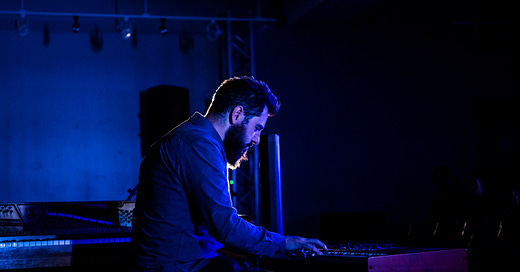On a recent episode of very popular music podcast - I won’t say which - a guest said that TikTok1 is the new open mic. And I’m still trying to get over it.
I’ve played and/or attended many open mics in my time. TikTok is nothing like an open mic.
Consider this…
At an open mic, there are real people who took real time out of their day to be there. They're invested in the event, not checked out, blurry-eyed, and waiting to be a-mused to death.
At an open mic, the audience (which includes every performer until it's their turn) has to sit through every performer's full set. The bad ones can be brutal, but it makes the good ones all the sweeter. And everyone walks away happy and fulfilled.
At an open mic, performers don't have to be someone they're not, sacrifice their mental health, and compromise their work for an algorithm. There’s a built-in audience ready to receive anything without expectation. There’s no need to stand out, capture attention within 2 seconds, bait for clicks, or invest time and money into gear and skillsets that have nothing to do with their art.
At an open mic, people with different interests and backgrounds come together - literally, physically - to the same place at the same time and have a real experience together. There are no echo chambers here or bias confirmation. Just community.
What’s Going On?
The reason anyone would ever say that TikTok is the new open mic - and why this highly-respected podcast host would let this person get away with saying it - is because we musicians have no other choice. This is our lot now. All the avenues we used to have for letting people know we made a thing - radio, record stores, small-to-medium music venues, mixtapes and compilation albums, endcap CD displays, music critics and album reviewers, media interviews, and, yes, open mics - are dead or dying.
Social media has coopted all the mediums we citizens used to use for staying connected. Local newspapers, local radio and TV stations, mailers, magazines, etc., if they even exist anymore at all, have became empty shells of what they used to be.
No, I’m not a stodgy ol’ curmudgeon. These changes weren’t all bad. The old system was far from perfect. For awhile there, social media kinda worked. It was more effective, convenient, democratic, not to mention saved a lot of trees. But it didn’t work for long.
The allure of free, frictionless, global connection gradually began putting the old institutions out to pasture. And many of us (myself included) eagerly threw the baby out with the bathwater. Coupled with their rise to dominance, social media platforms created the “like” button, news feeds, and eventually the almighty Algorithm, creating what has become, in my opinion, the most powerful and perhaps destructive drug in history. Now, having a monopoly on connection, they’ve all but discarded connection for the ad-selling benefit of keeping eyes glued to a screen for hours upon hours upon hours no matter the societal cost.
This is our lot now - both musicians and audiences. Between us stands an algorithmic gatekeeper, one far more oppressive and homogenous than the old one. Perhaps TikTok is the new open mic.
Perhaps we ought to take a few steps back. More on this soon.
What I’m Loving Right Now…
Sam Harris, however you feel about him, has some very cogent things to say about social media, specifically Twitter, though the ideas apply perfectly well to all platforms. I recommend listening to any episode from his podcast that touches on this subject (in particular, “Why I Left Twitter”).2
More recently, he did an interview with Cal Newport (author of Deep Work, Digital Minimalism) about productivity, but the first 30min are a discussion between these two powerhouses about the post-pandemnic, post-Elon-Musk period of social media. Worth the time.
I’m aware of the timing here, that, as of this week, TikTok won’t be here in the US much longer. But this post isn’t specifically about TikTok.
Full episodes of Sam’s podcast are behind a paywall, but if you use my links, you’ll be able to listen to each in its entirety.








Yes, and It's time to reassess our reliance on algorithms and prioritize genuine community engagement.
Thanks for the restack!